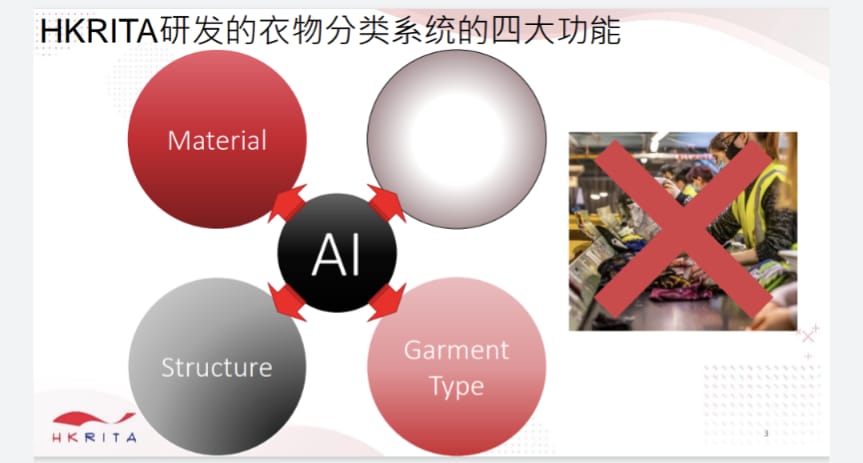
Intertextile Shenzhen Apparel Fabrics 2024 wasn't just about showcasing products. The 2024 edition of Intertextile Shenzhen Apparel Fabrics concluded after a successful three-day run at the Shenzhen Convention & Exhibition Center in Futian. The event, which took place from June 5th to 7th, served as a platform for industry leaders to convene and share expertise. Visitors were treated to a series of fringe events featuring experts from organizations like HKRITA, Pantone, and the Nano and Advanced Materials Institute (NAMI). These events provided valuable insights into the cutting edge of the textile industry.
Revolutinising Textile Recycling
To address the issue of Textile Recycling, Raymond Chiu, Senior Research Manager, HKRITA made a presentation during the event on AI-powered garment sorting system that HKRITA has developed that can accurately classify and sort used textiles for recycling. This innovative technology has the potential to revolutionize the textile recycling industry and make a significant contribution to environmental sustainability.
Key Features of the AI-Powered Garment Sorting Syste
The AI-powered garment sorting system utilizes a combination of advanced technologies, including:
• Hyperspectral imaging: This powerful imaging technique allows the system to identify the chemical composition of textiles, even in blended materials. This is crucial for accurately sorting textiles for recycling, as different fibers require different recycling processes.
• Image recognition: The system uses advanced image recognition algorithms to identify the type of garment, such as a t-shirt, jeans, or dress. This information can be used to further optimize the sorting process and ensure that textiles are recycled into the most appropriate products.
• Machine learning: The system is continuously learning and improving its accuracy as it processes more data. This means that it can become more effective at sorting textiles over time.

Benefits of the AI-Powered Garment Sorting System
The AI-powered garment sorting system offers a number of benefits, including:
• Improved recycling efficiency: By accurately sorting textiles, the system can help to ensure that they are recycled into the most appropriate products. This can lead to higher-quality recycled materials and a reduction in waste.
• Reduced environmental impact: By diverting textiles from landfills and incinerators, the system can help to reduce the textile industry's environmental footprint.
• Increased economic value: The system can help to create new markets for recycled textiles, which can lead to increased economic opportunities for the textile industry.
Application in Jeans Recycling
HKRITA has developed a specific solution for recycling used jeans, focusing on the recovery of the warp yarn. This solution utilizes the AI-powered garment sorting system to identify and separate the warp yarn from the weft yarn and other components of the jeans. The recovered warp yarn can then be recycled into new denim products.
Potential to transform textile recycling
The AI-powered garment sorting system is a promising technology that has the potential to transform the textile recycling industry. By improving recycling efficiency, reducing environmental impact, and increasing economic value, this system can play a significant role in creating a more sustainable textile industry.












